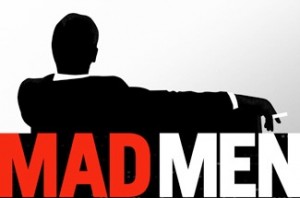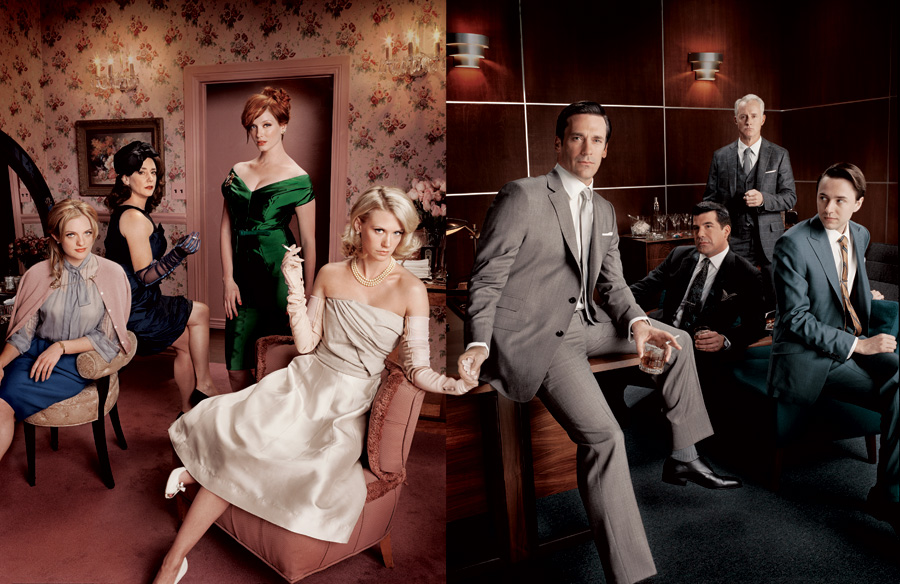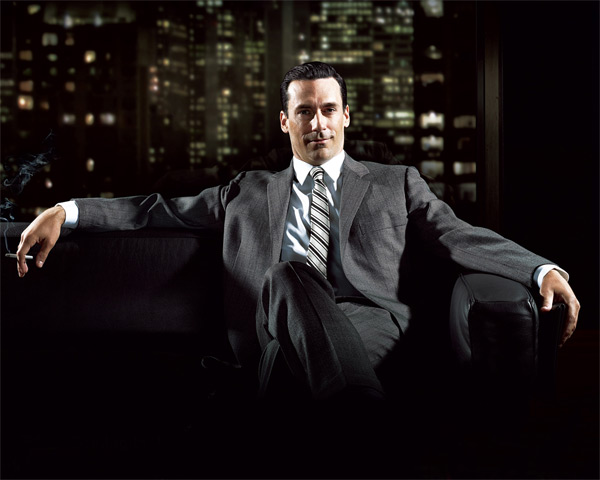You know those moments when you’re too tired to be productive, but too awake to sleep? I’ve developed a few systems to utilize those eras (also known as afternoons). One of my favorites is to put some Chinese websites’ lack of concern for copyright law to good use by catching up on TV shows that seem noteworthy. That was how I got addicted to Lost and figured out enough Prison Break to appease my students. So, when I was sick a few weeks ago, it started a concentration binge that let me blow through almost three seasons of TV in as many weeks. This time, I took recommendations from blogger friends—primarily Heather—to focus on Mad Men.

If I weren’t already sick, I think Mad Men would have done it.
You weren’t expecting that, I’d assume. Let’s talk about what most people say:
- The acting is great. Check.
- The photography is stunning. Agreed.
- The writing is extraordinary. I happily concur. The dialogue (with a few notable exceptions) is a living, breathing example of why I wish I had a team of screenwriters with a great sense of both the next scene and the historical impact of the moment cueing my every utterance.
- The story is fabulous. This is where I get off. Since when do flat characters proving just how well you know them equal plot arcs? I do give props for avoiding the ‘everything you thought you knew was a lie’ cop-out certain seasons of Lost and every five minutes of Smallville fall back on. And they don’t undercut characters’ fundamental personas to give them dynamism (The Office). So, I’ll give it a ‘solid’, but refrain from handing out awards (Yes, I see the irony, but if President Obama’s Nobel taught us anything, it’s that even the big awards tell us far more about the givers’ biases than the receivers’ merits).
- It’s historically enlightening. Oh please.
We could discuss finer points of the show for a good long while, but others have been quite effective in this approach. So allow me to revert to my tried and true method of discussion: broad generalizations.
Mad Men is about one thing: escapism.
We’re working on two levels here. First, escapism is the driving force behind every character and most plot advances. Don is scary good at it; Pete is painfully ineffective. Peggy runs from obvious goblins; Betty’s have yet to be unmasked (and dumping the psychiatrist was terribly unfair). Whether living behind a mask (everyone except Roger) or flaunting your disregard for propriety (um, Roger), everyone scurries about trying to hide their tragic flaw only to collapse comfortably back into its clutches at the first sign of trouble.
Of course, the primary escape is sex. Who in the show doesn’t have some sort of sexual struggle? I mean, even Glenn has some weird surrogate Oedipus complex. I’m tempted to say this is just to keep people watching, but not having lived through the ‘50s or ‘60’s, I can’t really speak with authority. Still, it’s like watching a kung-fu movie: there is nothing even remotely realistic in the frequency and extremity of the action, but it just keeps scaling up.
So, why the fascination with the show? Because we’re all there.

Personally, I’m Don. Yes, I’m sure everyone says that. Hear me out. I’ve never assumed a false identity, cheated on my wife or ignored my brother into suicide, but I’m always controlling others’ perceptions. I can’t stop. Ever. I’m totally able to be separate people—and switch between them convincingly and almost instantly. Of course, some distance and locked doors help. And then the occasional three-week binge that terrifies everyone too much to ask what it was. I understand people—I have to. My mistakes are almost never open, and those who know about them usually respect the façade enough to keep from blurting it out. People brought face to face with my ugliness tend to downplay it out of respect, genuine love or fear of the mystery.
Maybe you’re more the ‘quiet desperation’ Betty. Possibly, with the Henry Francis release valve or, more realistically, without it (or the tastelessly gratuitous bar fling). Correctly or not, you think the world hates you, so you hate it back. And watch it pass you by. Smile when you have to.
Need recognition, anyone? Pete’s there with you. Try to fit the socially-prescribed mold? You and Joan connect. Desperate to be progressive and in-touch? Better start growing a beard (probably a soul patch), because you’re Paul. Wanting to break out but disappointed whenever you do? I think Peggy has your line.
Give me one truly satisfied (semi-meaningful) character in the show. Even Sally only gets enough attention to allow her vices to manifest themselves. Have you seen the opening? A dude falling helplessly, but finally presented as sprawling confidently in his chair. Nihilism, cynicism and pragmatism stew under surfaces thin enough to allow everyone to recognize a problem but present enough to keep them from discussing it.
Which brings us to the second way the show is about escape. We watch it to escape. No one (in the show or in reality) is really happy to be hiding. While confession is rare, admission upon confrontation is somehow freeing. So we admit our faults by identifying them as we watch. This is true personally and corporately. The corporate evils (sexism, racism) and the personal ones (greed, lust) the show highlights are ours. Viewing such evil allows us to identify and vilify it. Yet that third-party identification doesn’t actually condemn us directly. We admit it, but escape any consequences. In fact, we cheer for Don when he pulls off his trysts and secretly love the hedonistic office parties while shaking our heads in disgust. And if you think your disgust is genuine, explain why you’re still watching. 1
So allow me to add my voice once again to a growing chorus calling for true confession and transparency. I’ve advocated this to friends for some time. Admitting wrong and accepting the consequences or forgiveness that follows is absolutely necessary.

And hard.
At least, that’s what I’m saying now.
- My explanation is admittedly brief. That’s because the alternative is extremely involved. The above-referenced article takes on some of the ramifications in a national, corporate sense. ↩

I’m sorry your exposure to Mad Men wasn’t of the mind-blowing variety; however, I hope it at least provided a bit of distraction from your illness-induced agony.
Goodness knows I’ve harped enough about why *I* love the show; I think we have some common ground in the aesthetics of it. Your archetype comparisons are certainly apt.
I’d like to posit Ken Cosgrove as our best candidate for “satsfied character.” A recent article by TV critic Alan Sepinwall (whose excellent blog I would also recommend) suggests that we see so little of Ken precisely BECAUSE he’s happy…and happiness doesn’t make for much on this show. His recent promotion aside, things seemed to have worked out pretty well for him, eh?
At any rate, I won’t argue the voyeuristic thrills viewers like me get from the show. I’ll never be half as glamorous as Betty, as self-assured as Joan, as successful as Don. But by watching them, I can live vicariously as the trophy wife, office sexpot, or executive. Just as good, with less booze and STD risk.
@Heather: Ken is, indeed, quite satisfied (other than the insatiable sexual appetite that dominates the office; and even that seems to be just fun for him, unlike most of the others). Indeed, his role on the show seems to be pure antagonist—usually for Pete. When has Ken mattered to the show? 1) Published in Atlantic. 2) Making more than Crane. 3) Appointed co-head of accounts. Altogether good, inadvertently causing others pain. He exists to happily antagonize. As your recommended Alan Sepinwall (I’ll link him, but I can’t add any TV critics other than you to my reading list.) would seem to suggest. And, don’t be misled—despite my lack of being overly-impressed, I have watched every episode available on Youku (they seem a few weeks behind).